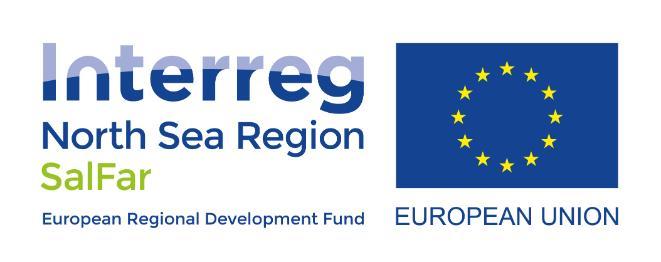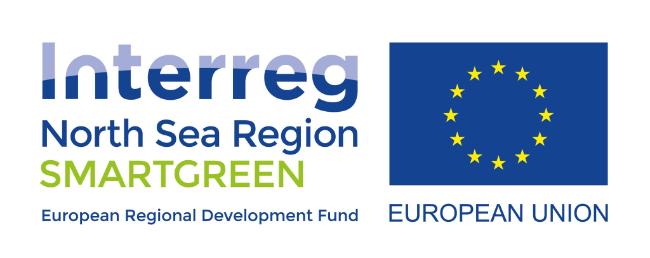Current Live Projects

Horizon 2020 Fairway Project - Senior Lecturer Isobel Wright and Researcher Jenny Rowbottom are working closely with ADAS and Anglian Water to improve drinking water quality across Lincolnshire.
The European Commission is investing almost 5 million euros from its research and innovation budget under the Horizon 2020 programme into the FAIRWAY consortium of projects and partners across Europe. This project aim to deliver new solutions, proven good practices and innovative governance models to protect drinking water resources from nutrient and pesticide pollution.
Safe drinking water is vital for human health and diffuse pollution of nitrogen and pesticides from agriculture is the main obstacle to meet drinking water quality targets. FAIRWAY is looking to review approaches for protection of drinking water resources against pollution by pesticides and nitrate, and to identify and further develop innovative measures and governance approaches for a more effective drinking water protection. Under these objectives, FAIRWAY is running a series of projects.
Issues with water quality in the Anglian region predominantly relate to high nitrate concentrations and pesticide contamination of surface waters. Anglian Water, the largest of 10 treatment and water supply companies in the UK, supplying drinking water to 4.2 million customers across England and Wales, are collaborating with the University of Lincoln and ADAS to improve drinking water quality by communicating with farmers and land managers in water catchment areas.
Anglian Water is working to improve drinking water quality using three approaches to encourage change in farmer practice, reducing on-farm pesticide usage, with an initial emphasis on metaldehyde.
- Network engagement by Anglian Water catchment advisors with farmers and agronomist.
- An Ecosystem services approach where farmers were subsidised to use an alternative product to replace metaldehyde, which can be more easily removed in the drinking water treatment process.
- The third catchment has had minimal intervention from Anglian Water; and Lincoln Institute for Agri-Food Technology (LIAT) is developing innovative approaches for farmer engagement in this catchment, which will be monitored and compared to other modes of farmer engagement.
LIAT are using surveys and interviews with farmers in the three study areas, to gather data around farmers’ current pesticide handling behaviour and practices, business characteristics, factors influencing practices and cost-effectiveness as well as wider effects.
The study will report on critical factors in developing an intervention programme for long-term change.
Read an update about this project in our latest blog post Striving for Excellence in Keeping Your Drinking Water Safe and Clean.
‘The FAIRWAY project has received funding from the European Union's Horizon 2020 research and innovation programme under grant agreement No 727984’

A project hoping to tackle the high cost of retail refrigeration has been led by a consortium comprising the University of Lincoln UK, Tesco Stores Ltd, the Grimsby Institute and Intelligent Management Systems Ltd. The full-scale project is called the Development of Dynamic Energy Control Mechanisms for Food Retailing Refrigeration Systems.
The cost of retail refrigeration totals more than 14% of the UK’s electricity usage and also represents roughly a third of a typical food and drink retailer’s energy cost. Supermarkets across the nation currently utilise thousands of refrigeration units, not only to keep our food and drink chilled but also to prolong the shelf life of produce and prevent the growth of harmful bacteria.
The research demonstrates the largest Demand Side Response (DSR) project to food retailing networks using the Internet of Things (IoT) technology. In the video below, Director of the Lincoln Institute for Agri-Food Technology (LIAT), Professor Simon Pearson, discusses how the Knowledge Transfer Network (KTN) helped identify funding through an Innovate UK competition.
Working collaboratively with partners, the University of Lincoln, UK, designed and built the Research Refrigeration Centre (RRC), which is the first facility of its kind in the UK and internationally. The centre precisely models the essential dynamics of a typical Tesco Express convenience store, providing space for researchers to explore the development of innovative refrigeration systems. This enables the team to discover new ways of thinking and create greater outcomes with a direct industry application, for example defining an optimum network infrastructure and control system to facilitate more efficient pack operation. In addition, the RRC is available as a demonstrator unit to other commercial organisations from the UK and internationally, making it a global centre for research into refrigeration technologies, which has helped the consortium to develop new relationships with world-leading organisations such as Walmart and Shell.
Throughout the project, the RRC has allowed the materials and systems developed by IMS and academics to be prototyped and tested in a simulated environment, making it a facility that can take blue skies thinking all the way through to mainstream industry in the shortest possible time. The University used the facility to establish a detailed understanding of engineering risks, by developing the first mathematical model (Matlab) to accurately mirror the essential dynamics of a Tesco Express convenience store, and using this to monitor response to DSR events. The team also developed a robust Simulink model of a 3-phase power system, which demonstrated the capacity of a massive refrigeration network to hold off a considerable load in response to a DSR event (circa 44MW across 112,000 assets). All of which developed industry confidence in the proposed candidacy solution.
The University of Lincoln has also created a new capability in the use of data and data analytics to build highly complex algorithms to balance the use of spare refrigeration capacity to generate revenue potential for demand response while, at the same time, ensuring food quality is not undermined.
Lincoln’s research has helped to raise the profile and reputation of the project within both the academic community and industry, achieving 4* publications and dissemination at international conferences and events. The project was also selected as a subject for a prestigious KTN case study. New opportunities to profit from the knowledge gained from this project include a successful EPSRC “Internet of Food Things” grant, plus a recent BBSRC Seeding Catalyst award, which will enable IMS, Tesco and Lincoln to continue working together to develop Refrigeration AI Control Technologies to resolve real-world issues such as optimising system performance in order to mitigate food wastage.
Agriculture in the coastal regions of Northern Europe is particularly vulnerable to the impacts of climate change. Rising sea levels, saline intrusion of groundwater and greater pressures on our freshwater supplies have led to concerns about the impact of salt deposition on farmland soils.
SalFar (saline farming), is a project which aims to mitigate the potential threats of salinization through a collaboration of climate experts, researchers, educators, farmers, entrepreneurs and policy makers. In order to accomplish this, the project will conduct research on the salt tolerance of crops, demonstrating alternative methods of farming under saline conditions and creating new business opportunities for farmers, food producers and entrepreneurs.
The project is co-funded by the European Union Interreg programme for the North Sea Region and involves partners from Belgium, the Netherlands, Germany, Denmark, Sweden, Norway and the UK.
The University of Lincoln, SalFar’s UK partner, is taking a multidisciplinary approach to the project. The Lincoln Institute for Agri-Food Technology (LIAT) have joined forces with the School of Geography and Lincoln International Business School to model the current and future agricultural risks of salinisation, trial salt tolerant crops, and explore the business case for saline agriculture.
More information can be found online.
Contact: Dr Iain Gould igould@lincoln.ac.uk

Greenhouse production of fresh fruit, vegetables and ornamentals is a successful, innovative component of the North Sea Region (NSR) economy with an output of €9 billion per year and directly employing more than 500,000 people. It embraces more than 10,000 SMEs with a high-value supply chain and it helps provide sustainable and healthy food to consumers. However, the producers in the NSR are facing challenges, such as high reliance on energy, water and low use of renewable energy. Eco-innovations in new or improved control methods and services is needed to reduce the use of resources (energy, water and chemicals) and to decrease the CO2 emission.
SMARTGREEN will use novel Big Data analysis of climate and production data to pinpoint unnecessary energy use and to improve the climate control. Combined with research and practical demonstrations in commercial greenhouses, this will secure a leap towards a greener and energy efficient production system. SMARTGREEN connects experienced research groups, leading SMEs and supporting companies to promote the greening of the NSR. By fostering innovative eco-enterprises, we can ensure greener growth, whilst reducing the environmental footprint significantly less pollution, lower emissions and longer-lasting use of resources. The transnational nature of SMARTGREEN will stimulate the development and adoption of eco-friendly and low-carbon products, green services and processes in NSR greenhouse industry.
Beneficiaries and co-beneficiaries: Aarhus University, Proefcentrum voor Sierteelt (PCS), University of Southern Denmark, Hochschule Osnabrück, The Netherlands Organization for Applied Scientific Research (TNO), Norsk Institutt for Bioøkonomi (NIBO), Landwirtschaftkammer Niedersachsen Hannover Ahlem (LWK), Provinciaal Proefcentrum voor de Groenteteelt Oost-Vlaanderen (PCG), Potplantenkwekerij Dirk Mermans, Knud Jepsen (Queen®), Urban Crop Solutions.

All other live projects at the Lincoln Institute for Agri-Food Technology
- IT as a Utility Network – Feasibility of the Internet of Things for domestic refrigerators, food safety and waste
- Innovate UK – Autonomous robots to support fruit picking
- Berry Gardens Ltd – The potential for automation in the soft fruit industry
- Innovate UK / Biotechnology and Biological Sciences Research Council – Third generation polyethylene greenhouse cladding materials
- Agriculture and Horticulture Development Board – Optimised greenhouse light environments, modelling whole plant responses to spectral quality
- Science and Technologies Facilities Council – Synthesis of remote sensing and novel ground truth sensors to develop high-resolution soil moisture forecasts in China and UK
- Agriculture and Horticulture Development Board – Development and demonstration of an automated selective broccoli harvester
- Innovate UK – 3D vision-based crop-weed discrimination for automated weeding operations
- Innovate UK/ Biotechnology and Biological Sciences Research Council Spark Award – Laser-based sensing technology for improved control of spraying booms for agricultural spraying vehicles